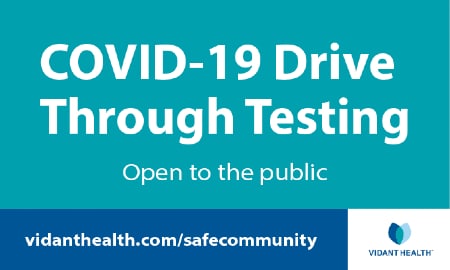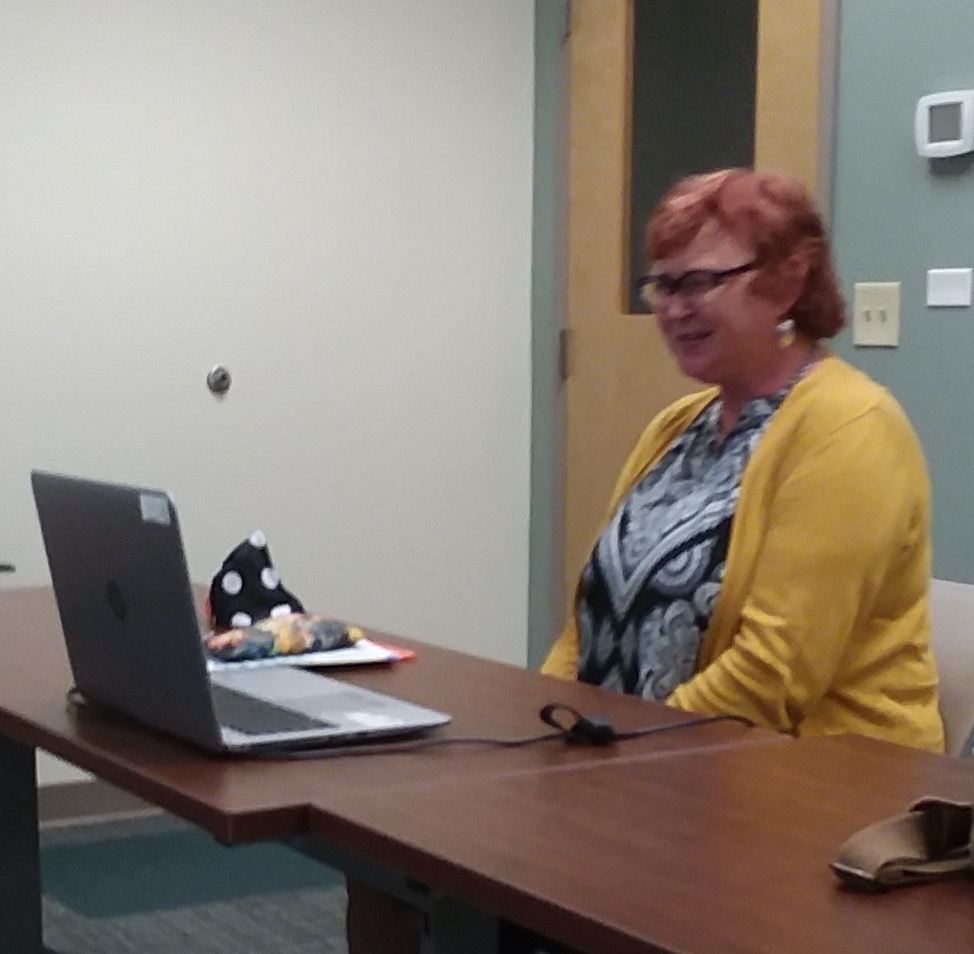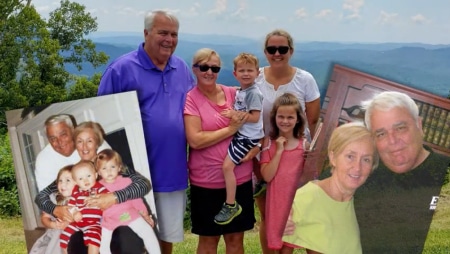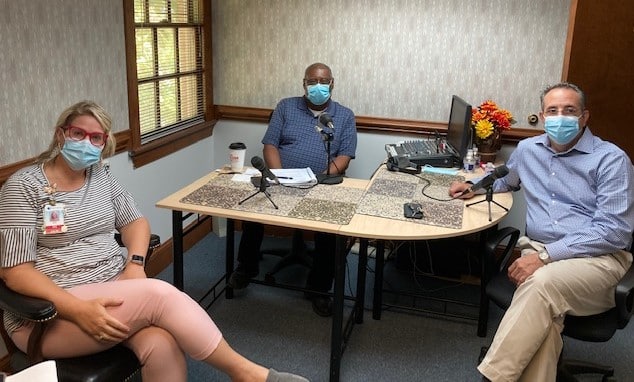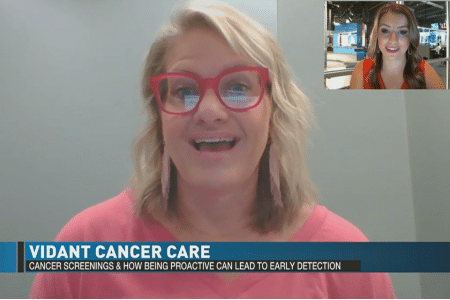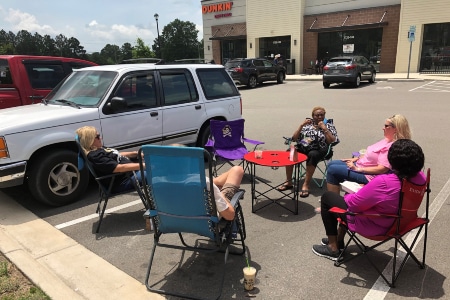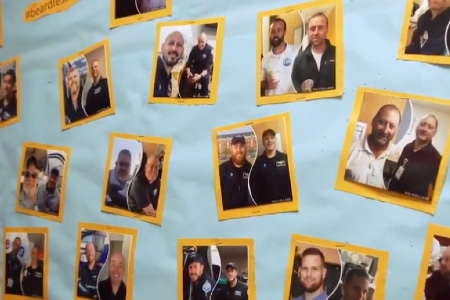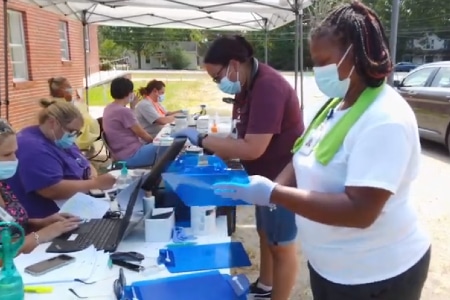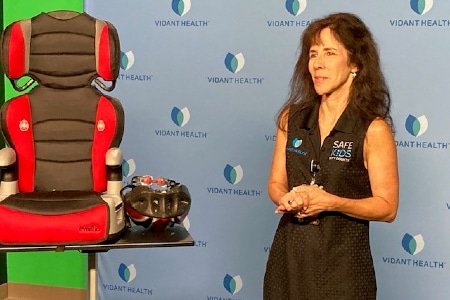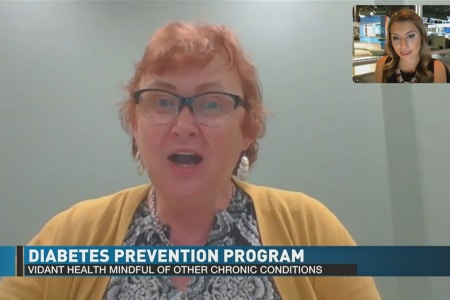The Greenville COVID-19 Drive-up Testing Site will be open, Saturday, Dec. 5 from 9 a.m. to 3 p.m.
COVID-19 testing is covered through the CARES Act and currently there are no out-of-pocket costs to the public. Insurance is not needed for a COVID-19 test at the Greenville site, however, health care organizations must collect and submit insurance information for patients that have it, per the CARES Act.
The Greenville COVID-19 Drive-up Testing Site is at the corner of Stantonsburg Road and Wellness Center Drive.
Visit VidantVerified.com for more information
Type 1 diabetes results when a person’s body cannot produce insulin, the hormone needed to regulate blood sugar levels, and you have to receive insulin injections. Type 2 diabetes occurs when your pancreas works, but not as well as it should. Lack of exercise and eating too many carbohydrates can affect insulin levels and contribute to Type 2 diabetes. Prediabetes is a signal to make lifestyle changes before becoming type 2 diabetes.
The best steps to take in your journey to control blood sugar levels include healthier eating, physical activity, stress reduction and coping skills, all of which are important in diabetes prevention, according to Vidant Lifestyle Nurse Specialist Susan Houston.
Houston said, “One of the most important steps or changes someone who is facing diabetes can make is to accept this status and start a plan to embrace a new, healthier lifestyle.” One of the first steps is to monitor your blood sugar levels. Knowing these numbers will help gauge how well a person is maintaining a healthy blood sugar level. Another key step is making changes in diet and exercise. Watching carbohydrate intake and portion size will make an impact on glucose levels as will moving your body more.
Houston said, “Holiday eating can be a tricky time for diabetics, but there are some simple techniques to help with the food temptations this season.” She suggests using a smaller plate and not going back for seconds and placing a teaspoon in your macaroni and cheese and sweet potato casserole. Use the big serving spoons for the vegetables like green beans, Brussel sprouts and salads; foods that would be lower in carbohydrates. And for dessert, cut the pies and cakes into smaller pieces to help with calorie consumption.
For more information about diabetes prevention information, contact Susan Houston at 252-847-1436.
Washington, and eastern North Carolina in general, is a small, tight-knit community. Something that affects one of us, affects us all. The outpouring of support that my family received when my dad passed away on Aug. 12 due to complications from COVID-19 only confirmed this.
This holiday season, our family is one person smaller. I want to take this moment to share our family’s experience with COVID-19 in the hopes that those in our community consider taking added precautions to make their holiday gatherings as safe as possible.
Dad’s personal experience with COVID-19 taught us a lot about the dangers of this virus. Early on, our family took some steps to protect ourselves, like wearing masks at community events and staying at home more than usual. We were following safety guidelines, but we weren’t doing things perfectly.
Everything hit home when our family was directly affected. In total, we had six family members who caught COVID-19, including my children and myself. It was different for all of us and some barely had any symptoms at all. My dad got the worst of it, though, and it was not long before he was at Vidant Beaufort Hospital and later ECU Health Medical Center to get intubated and receive treatment.
The care team that treated my dad at both Vidant Beaufort and VMC were amazing. They patiently answered our questions, helped us understand potential treatments and kept us in the loop on his status. In the end, the virus took its toll and my dad passed away.
Make no mistake, this virus is real and it does not care about who it infects. I encourage everyone, especially my fellow Washington community members, to take extra precautions this holiday season: wear a mask, social distance and practice the safety measures that can help us care for each other.
Dad always encouraged us to get outside of our comfort zones and penning this letter is not easy. In life, my dad was a community servant committed to doing what was right. In death, that spirit continues to live on. If he was still here with us, he would want us all to work together, wear a mask, social distance and take care of each other because our community depends on it.
Sara Hodges Bell is the daughter of the late Washington, N.C., mayor, Mac Hodges.
“The fear of regularly-scheduled health screenings in the time of this pandemic is making a huge impact on early diagnosis, when it is easier to treat cancer,” said Nikki Hyatt, ECU Health Cancer Care outreach coordinator.
Dr. Emmanuel Zervos, surgical oncologist for ECU Brody School of Medicine and Vidant, and executive director of ECU Health Cancer Care, echoed those sentiments, noting that early detection leads to improved outcomes.
“Monitoring patients at risk for certain cancers or who meet recommended age criteria is the key to the early detection. Cancer screening is the best way to detect cancer before symptoms arise,” Dr. Zervos said. “The easiest cancer to treat is the one that never happens. The later we diagnose a cancer, the more limited and less effective treatment options become.”
Screening is recommended as early as age 30 for some cancers, especially in higher risk patients as part of their regular health routine. The American Cancer Society is now recommending PSA testing beginning as early as age 40 for high risk patients like African-American males with strong family histories of prostate cancer.
For breast cancer, mammography screening should begin at age 40 for normal risk patients and 30 for patients with known genetic mutations or syndromes or a history of radiation treatment to their chest between the ages of 10 and 30.
Dr. Zervos shared that anytime you are experiencing symptoms before the recommended age of screening, you should consult your primary care physician. Certain risk factors including race, family history, smoking tobacco and drinking alcohol all factor in to the need to initiate cancer screenings.
For those concerned about their risk for cancer, the Vidant Cancer Prevention Clinic is open and offers information about cancer prevention as well as treatment resources. For more information about the programs and resources at ECU Health Cancer Care, please call 816-RISK (7475).
From February to April, routine cancer screenings dropped 90 percent due to the COVID-19 pandemic, but cancer is not going away. Read more »
Typically, these conversations and meetings would come at various ECU Health Cancer Care events but since the onset of COVID-19, in-person group gatherings have been put on hold.
Dale Naylor, a breast cancer survivor, said after the last meeting at ECU Health Medical Center in early March, she made it about a month before she had to get out and see what she calls “her family” in the survivorship group. The group has set up in front of FreshVibes once a week since early April to get together and enjoy each other’s company while practicing social distancing.
“It started with two pickup trucks, we were sitting on the tailgates,” Naylor said. “The next week when we came, we sat out in a parking space and put some chairs out and we’ve been doing it ever since the first week of April.”
The group has been finding some sense of normalcy in these get-togethers and sharing in each other’s journey is helping everyone through a challenging time.
Naylor said the best part about the group is how close they have become and their openness and honesty with one another.
“It’s wonderful because not only have we experienced similar journeys, but we’ve grown into a very cohesive group. It’s like missing part of your family,” Naylor said. “This has pretty much helped all of us stay sane, so to speak.”
Along with these weekly informal meet ups, the group has been meeting with Jenny Higgins, a psychosocial support and survivorship coordinator with Vidant Health, via video conferences for different classes each week.
“Right now, we’re doing everything via (video calls), we do knitting together, journaling, art class and now we’re doing yoga. It’s good to have some kind of normalcy,” said Charlotte Forjoe, a breast cancer survivor.
Forjoe said she received her care at Vidant and the patient-centered approach, from the attitude of valet service to the personal touch of the doctors, made all the difference. The services available through the survivorship program have been crucial for Forjoe.
“These classes that are free to us, it was a way for us to come together and we all had a common bond – and that was cancer,” Forjoe said. “Family is great, but people who have experienced it and that you can talk to and be open with, without judgement, that’s what you need sometimes.
“Even though I had family, I kind of gravitated more toward this group. They became my extended family and the family that I needed at that time to help me emotionally through it,” Forjoe said.
Like Naylor, Forjoe said the group has become an extension of her family and having the extra support system in place has helped her through her cancer journey.
She said she even makes a point to seek out patients at Vidant and in the community to tell them about the program and let them know of upcoming events.
“I’m that much of a believer in what Vidant offers and what they give to you as you’re going through that process,” Forjoe said.
For Forjoe, the survivorship group is about much more than surviving after a cancer diagnosis. She sees herself, and the other members of the survivorship group, taking advantage of a new outlook on life, and truly thriving.
“I’m a thriver. I’m going to live life,” Forjoe said. “To me, just surviving means you’re going through life, but I’m thriving, I’m going, and I’m not going to let cancer stop me or beat me. So I’m thriving – and we all are.”
“I enjoy being outside, a lot,” said Paul Johnson, a transport RN with Vidant EastCare.
It’s one the perks for Johnson.
“I am not found of heights, I don’t like flying but it was worth it,” Johnson said.
The Bertie County native is no stranger to doing what it takes to get the job done.
“It looks pretty ridiculous, the moustache does,” Johnson said, “but that’s kind of what I’m going for, too. A little bit of fun.”
A little bit of fun – and a look that’s a lot different these days.
“Full beard – I tried to keep it somewhat trimmed but maybe not much – it was pretty scraggly,” Johnson said. “I enjoyed it. I quit shaving the day I got out of the Army and didn’t have to shave any more.”
That was 11 years ago – until COVID-19 and the need for all health care workers to wear a mask and other protective equipment.
“Saw the cases pick up in the state, certainly across the country and it was like, ‘Well, if I haven’t transported one of these patients it’s just going to be a matter of time,’” Johnson said.
So the beard had to go, to help ensure the proper fit of the masks necessary to help keep Paul, his colleagues and the patients they transport safe.
“The N-95 seals around the perimeter, the bridge of your nose and around here,” Johnson said.
Going facial hair free for ENC was easier said than done for communications specialist Jack Moye.
“You trim it, and you make sure it looks just right and you pet it – but yeah, it’s hard,” Moye said. “When you’re looking in the mirror and you’re about to make that first cut, it’s very difficult to do.”
Luckily Paul and Jack are in good company. EMTs, pilots, paramedics, at least one person in every EastCare role has done the same. It’s a show of solidarity and a commitment to one another and the patients Vidant serves.
“If we start getting sick, there’s not going to be anybody to bring these patients into the hospital,” Johnson said. “If nurses in the hospital start getting sick, there’s not going to be anybody to take care of those patients – we need to at least stay healthy as long as we can.”
The team mentioned they appreciate all of the community support being shown to health care workers on the front lines. As they go facial hair free for ENC, they encourage everyone to do their part, by social distancing and staying home to stop the spread.
Vidant EastCare travels more than 900,000 miles a year – and handles more than 10,000 patient transports by air and ground combined.
“The virus is still present in our community and it is spreading, at a faster rate than before,” Brian Floyd, president of ECU Health Medical Center said.
Which is why staying ahead of increasing cases of COVID-19 is so important.
“At the outset of our awareness of COVID-19, the teams at Vidant Health came together and said, ‘what will be necessary to prevent its spread in the East?’ And one of the key objectives would be to find it, find it fast and know where it is so we can minimize it,” Floyd said.
Enter rapid testing and the ability to screen for COVID-19 across the region.
“We have a large-scale testing capability, so if there is a concern we want our public to seek out testing so that we can help make sure that we find, and minimize the spread of this virus in our region,” Floyd said.
Because the faster it’s found, the faster it can be dealt with.
“That’s what Vidant has been building,” Floyd said. “Thousands of tests can be done a day and returned within 24 hours because of the investments we made in building up this capability very early in the COVID-19 battle.”
In addition to rapid testing, Vidant is the only health system to partner with the North Carolina Department of Health and Human Services on their community testing initiative.
Having testing centers in place across the East is an important part of facing the pandemic heat-on. But it’s not a battle that can be won by hospitals and health systems alone.
“So it’s really important that we wash our hands frequently, we socially distance, and that we wear masks when around other people to help prevent the spread,” Floyd said.
As temperatures climb in late summer, it is critical to take precautions to keep everyone safe. Read more »
Susan Houston, lifestyle nurse specialist at Vidant, joined WITN for Healthy Habits segment Tuesday morning to discuss prevention of Type 2 diabetes and an upcoming Diabetes Prevention Program. She said it comes down to small changes we can makes each day, an improved diet and more exercise.
“The main two things would be moving a little bit more, 150 minutes per week is the bare minimum that we should be aiming for to help prevent or delay Type 2 diabetes,” Houston said. “Paying attention to the foods and drinks that we choose, because it’s all about choice, trying to limit carbohydrates. If there’s one thing with drinks you could avoid, it’s drinks that are heavy in the carbs and calories.”
Houston said another piece to avoiding Type 2 diabetes is taking care of your emotional well-being. During COVID-19, we know that anxiety and other mental health challenges can be exacerbated. These can affect how our bodies deal with sugar. Keeping tabs on your mental health is important in so many ways, including your risk of developing Type 2 diabetes.
Another important health habit is getting enough good sleep, Houston said.
“If we don’t have good sleep hygiene, that also can impact our internal stuff,” Houston said. “The stuff we don’t see is the stuff that’s really sneaky for Type 2 diabetes.”
Vidant Health is offering a free year-long Diabetes Prevention Program, and it is all about lifestyle changes each of us can make to help prevent Type 2 diabetes. The virtual program begins on August 27 and September 10 and is open to eligible participants who are at risk for developing Type 2 diabetes.
If you answer yes to five or more of the below questions, you are eligible for the free program:
- Are you over 40?
- Are you male?
- Are you a female with gestational diabetes?
- Do you have a parent with diabetes?
- Do you have high blood pressure?
- Are you physically inactive?
- Are you overweight?
If you are interested in the program, please call 252-847-5590 to be connected with a wellness navigator or visit TINY.CC/VIDANTDPP for more information and to inquire about the program.
